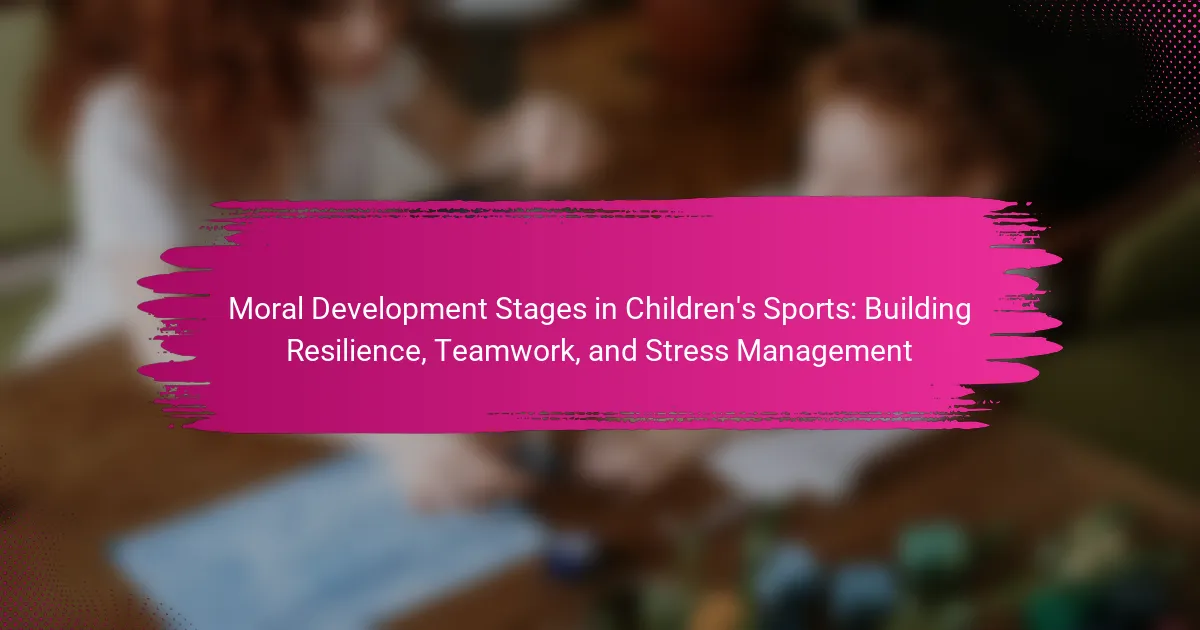Understanding moral development stages in children’s sports is crucial for fostering resilience, teamwork, and effective stress management. This article explores the progression from obedience to complex moral reasoning, highlighting the importance of social relationships and community rules in sports. Each stage contributes to children’s ethical behaviour and their ability to navigate challenges in team environments.

What are the moral development stages in children’s sports?
Moral development stages in children’s sports focus on fostering ethical behaviour, teamwork, and resilience. These stages progress from basic understanding of rules to complex moral reasoning.
1. **Stage One: Obedience and Punishment Orientation** – Children follow rules to avoid punishment.
2. **Stage Two: Individualism and Exchange** – Children recognise that different viewpoints exist and that rules can be negotiated.
3. **Stage Three: Interpersonal Relationships** – Emphasis on social approval and relationships; children learn the importance of teamwork.
4. **Stage Four: Maintaining Social Order** – Children understand the importance of rules for the community and team dynamics.
5. **Stage Five: Social Contract and Individual Rights** – Children begin to see rules as flexible and based on mutual benefit.
6. **Stage Six: Universal Principles** – Children develop their own moral principles based on justice and equality, transcending established rules.
These stages enhance children’s ability to manage stress and build resilience through sports.
How do these stages affect mental development?
Moral development stages in children’s sports significantly enhance mental development by fostering resilience, teamwork, and stress management. As children navigate these stages, they learn to handle challenges, collaborate effectively, and cope with pressure. This process cultivates essential life skills that support their overall mental growth. For example, engaging in team sports encourages empathy and ethical decision-making, which are vital attributes for personal development.
What role does resilience play in children’s sports?
Resilience plays a crucial role in children’s sports by helping them cope with challenges and setbacks. It fosters a growth mindset, encouraging young athletes to learn from failures and persist in the face of adversity. This attribute not only enhances their performance but also contributes to moral development, teamwork, and effective stress management. Building resilience through sports cultivates essential life skills, preparing children for future challenges both on and off the field.
What are the key components of resilience in young athletes?
Resilience in young athletes comprises mental toughness, adaptability, emotional regulation, and social support. These components foster a positive mindset, enabling athletes to overcome challenges and thrive in competitive environments. Mental toughness allows athletes to maintain focus under pressure, while adaptability helps them adjust strategies during games. Emotional regulation aids in managing stress and anxiety, and social support from coaches and peers reinforces their resilience.
How can coaches foster resilience in their teams?
Coaches can foster resilience in their teams by promoting a growth mindset and encouraging open communication. They should create a supportive environment where mistakes are viewed as learning opportunities.
Additionally, coaches can implement team-building exercises that focus on collaboration and problem-solving. These activities help athletes develop trust and support for one another, enhancing overall team resilience.
Regular feedback sessions are essential for reinforcing positive behaviours and addressing challenges. Coaches should emphasise effort and improvement rather than solely focusing on outcomes, cultivating a culture of resilience.
Finally, teaching stress management techniques, such as mindfulness or visualisation, can empower athletes to handle pressure effectively. This holistic approach strengthens both individual and team resilience in sports.
Why is teamwork essential for children’s moral development?
Teamwork is essential for children’s moral development as it fosters collaboration and empathy. Engaging in team sports teaches children to respect diverse perspectives and develop a sense of responsibility towards others. This interaction enhances their ability to navigate social situations and manage conflicts effectively. Additionally, teamwork builds resilience, as children learn to support each other through challenges, reinforcing the value of collective effort. Ultimately, these experiences contribute to their overall moral framework, shaping them into compassionate and socially aware individuals.
What skills are developed through teamwork in sports?
Teamwork in sports fosters essential skills such as communication, collaboration, leadership, and conflict resolution. These skills enhance moral development, enabling children to build resilience and manage stress effectively. For example, working together towards a common goal teaches children to appreciate diverse perspectives, fostering empathy and understanding. As a result, teamwork not only improves athletic performance but also contributes to personal growth and social competence.
How can parents encourage teamwork outside of sports?
Parents can encourage teamwork outside of sports by promoting collaborative activities. Engaging in group projects or community service fosters cooperation and communication skills. Family game nights can also enhance teamwork through shared goals and problem-solving. Encouraging children to participate in clubs or groups allows them to work with peers, building social skills and resilience. These experiences develop a sense of belonging and strengthen interpersonal relationships.
What stress management techniques are beneficial for young athletes?
Young athletes benefit from stress management techniques such as mindfulness, breathing exercises, and positive self-talk. These methods enhance focus and resilience during competition.
Mindfulness helps athletes stay present, reducing anxiety. Breathing exercises promote relaxation, aiding in emotional regulation. Positive self-talk fosters a constructive mindset, improving performance under pressure.
Incorporating these techniques into training routines can significantly enhance young athletes’ mental well-being and overall performance.
How can mindfulness practices be integrated into sports training?
Mindfulness practices can enhance sports training by improving focus, resilience, and stress management. Integrating techniques like meditation, breathing exercises, and visualisation helps athletes develop mental toughness. These practices foster teamwork by encouraging communication and empathy among players. Regular mindfulness sessions can lead to better performance under pressure, promoting a positive sports environment.
What are common stressors faced by children in sports?
Children in sports commonly face stressors such as performance pressure, parental expectations, and social dynamics. These factors can hinder moral development and resilience. Performance pressure often stems from competition and the desire to win. Parental expectations can create additional anxiety, leading to fear of failure. Social dynamics, including peer relationships and team cohesion, may also contribute to feelings of isolation or rivalry. Addressing these stressors is essential for fostering teamwork and effective stress management in young athletes.
How do cultural perceptions of sports influence moral development?
Cultural perceptions of sports significantly influence moral development in children by shaping values like resilience, teamwork, and stress management. These values are fostered through participation in sports, where cultural attitudes dictate the importance of competition and cooperation.
In cultures that emphasise individual achievement, children may develop a strong sense of personal responsibility but may struggle with teamwork. Conversely, cultures that value collective success encourage collaboration, enhancing social skills and empathy.
Research shows that children exposed to supportive sporting environments exhibit higher resilience and better stress management. For instance, studies indicate that children who engage in team sports report lower levels of anxiety and improved coping strategies.
Ultimately, cultural perceptions create a framework within which children learn to navigate moral dilemmas, fostering a sense of integrity and fairness in competitive scenarios.
What unique challenges do children face in competitive sports?
Children in competitive sports face unique challenges such as pressure to perform, balancing academics and athletics, and developing social skills. These challenges can impact their moral development, resilience, and teamwork abilities.
Pressure to succeed often leads to stress, affecting children’s mental health and enjoyment of the sport. As a result, many children struggle with anxiety and fear of failure. Balancing academics and sports can create time management issues, leading to burnout.
Social dynamics in team settings pose additional challenges. Children must navigate competition and cooperation, which can affect their ability to build relationships. This process is crucial for developing teamwork skills and emotional intelligence.
Addressing these challenges requires support from coaches and parents. Open communication, fostering a positive environment, and emphasizing personal growth can help children thrive in competitive sports.
What best practices can coaches adopt for moral development?
Coaches can adopt several best practices for moral development in children’s sports. They should model ethical behaviour, emphasise teamwork, and encourage open communication.
1. **Model Ethical Behaviour**: Coaches must demonstrate integrity and fairness, setting a standard for young athletes.
2. **Teach Teamwork**: Encourage collaboration and support among players, fostering a sense of community and shared goals.
3. **Promote Open Communication**: Create a safe environment for athletes to express their thoughts and feelings, enhancing trust and moral reasoning.
4. **Encourage Reflection**: After games, discuss ethical dilemmas and decisions made during play to reinforce moral lessons.
5. **Set Clear Expectations**: Define acceptable behaviours and the consequences of unethical actions, helping athletes understand the importance of morality in sports.
What are the common mistakes to avoid in youth sports coaching?
Common mistakes in youth sports coaching include neglecting moral development, emphasising winning over teamwork, and failing to manage stress. Coaches often overlook the importance of resilience, which is crucial for young athletes. They may also create a competitive environment that discourages collaboration, ultimately hindering social skills. Additionally, not addressing stress can lead to burnout, negatively affecting performance and enjoyment in sports. Prioritising moral development fosters a positive atmosphere, enhancing both personal growth and team dynamics.
How can parents support their child’s moral development in sports?
Parents can support their child’s moral development in sports by fostering resilience, teamwork, and effective stress management. Encouraging participation in team sports helps children learn cooperation and empathy. Parents should model positive behaviour, emphasising fair play and respect. Providing constructive feedback reinforces ethical decision-making. Engaging in discussions about sportsmanship cultivates a deeper understanding of moral principles. Additionally, celebrating both individual and team achievements builds confidence and resilience, equipping children to handle challenges.
What resources are available for parents to learn more?
Parents can access various resources to enhance their understanding of moral development stages in children’s sports. Books focused on youth sports psychology provide insights into resilience, teamwork, and stress management. Online courses and webinars offer practical strategies for fostering these skills. Local community programmes often include workshops for parents. Additionally, reputable websites and forums allow parents to share experiences and advice. Engaging with these resources can significantly support children’s moral development in sports contexts.
What are the long-term benefits of moral development in children’s sports?
Long-term benefits of moral development in children’s sports include enhanced resilience, improved teamwork, and effective stress management. These attributes foster a positive sports environment, encouraging children to navigate challenges and build strong relationships. Resilience enables children to cope with setbacks, while teamwork teaches cooperation and communication. Stress management skills help them handle pressure, leading to better performance and personal growth. Overall, moral development in sports cultivates essential life skills that extend beyond the playing field.


